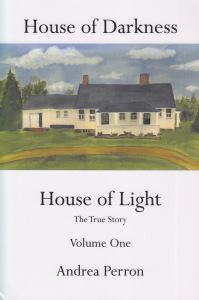 A book can be whatever an author wants it to be.When it goes through the publication process, however, it becomes a group effort.Granted, the other parties are motivated by money rather than by the message of the book, but they are professionals.Editors can point out what’s irrelevant, or beside the point.What you’ve already said, if you happen to repeat yourself.What you’ve already said, if you happen to repeat yourself.They change things, often, authors admit upon reflection, for the better.The self-published book shows itself as just what an author wants it to be.House of Darkness, House of Light: The True Story, by Andrea Perron is a case in point.In three volumes of about 500 pages each, it is (they are) the insider story of the family portrayed in The Conjuring.After having finished volume one, it’s clear the book needed an editor.
A book can be whatever an author wants it to be.When it goes through the publication process, however, it becomes a group effort.Granted, the other parties are motivated by money rather than by the message of the book, but they are professionals.Editors can point out what’s irrelevant, or beside the point.What you’ve already said, if you happen to repeat yourself.What you’ve already said, if you happen to repeat yourself.They change things, often, authors admit upon reflection, for the better.The self-published book shows itself as just what an author wants it to be.House of Darkness, House of Light: The True Story, by Andrea Perron is a case in point.In three volumes of about 500 pages each, it is (they are) the insider story of the family portrayed in The Conjuring.After having finished volume one, it’s clear the book needed an editor.
Don’t get me wrong; there’s some good stuff here.The first couple hundred pages are fascinating, although there’s a slow build-up into moving into the Harrisville house.One thing academics have always been too quick to do is dismiss the experience of non-trained observers.We have to be skeptical, of course, to spot those who are intentionally deceitful, but a person doesn’t write 1,500 pages without cause.People do experience strange things, and this book is a family’s recollection of events that inspired a horror movie.There were a few points in the course of reading through that I found myself pondering new perspectives on the realm of ghosts—shifts of point of view.There were many points, though, that I found myself muttering that an editor would’ve helped.
As a fully trained academic in the field of studies that handles issues of the soul, I am hungry for primary sources.Sociologists and psychologists get their information from observers—ordinary people.It’s only when the claims become extraordinary that such observations are called into doubt.We have all heard of haunted houses.We all know that sometimes strange things happen in them.We can explain such happenings in different ways.The skeptical explain them away as misperceptions, normal occurrences masquerading as paranormal.The credulous accept everything at face value.Truth, it seems to me, is a middle of the road phenomenon.I’ve always sat on the fence regarding ghosts.Too many people over too many centuries have reported them with great detail—witnesses include some very reputable and rational individuals—to dismiss them in toto.After volume one, it seems that something worth exploring took place in the eponymous house.For full impact, however, who you gonna call? This time you’d better make it an editor.
